Introduction to People Management
VerifiedAdded on 2023/01/11
|11
|2752
|30
AI Summary
This report discusses the various aspects of people management, including leadership, talent management, and development programs. It focuses on the case study of Easy Jet and its successful human resource practices. The report provides recommendations for improving performance and competitive advantage.
Contribute Materials
Your contribution can guide someone’s learning journey. Share your
documents today.

Introduction to people
management
management
Secure Best Marks with AI Grader
Need help grading? Try our AI Grader for instant feedback on your assignments.
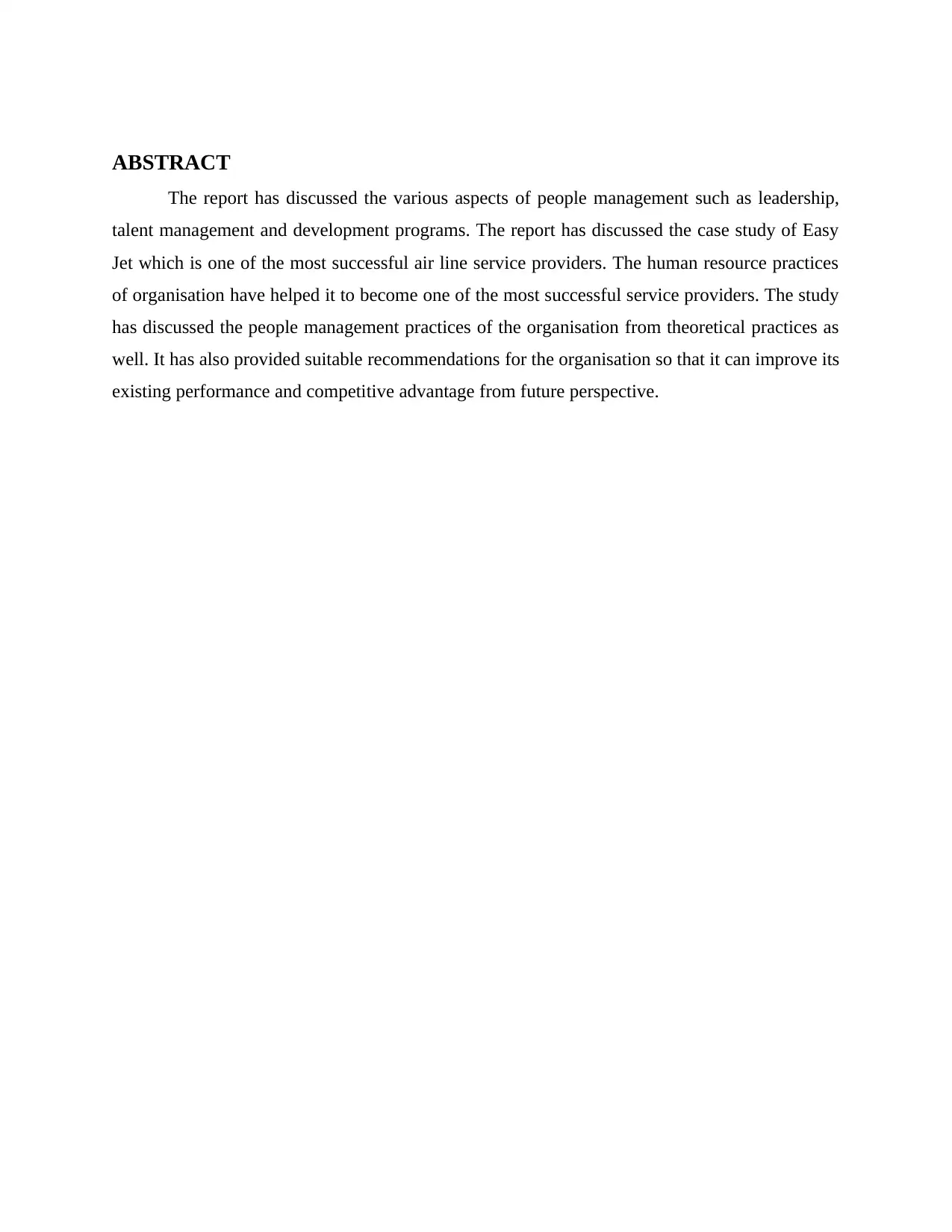
ABSTRACT
The report has discussed the various aspects of people management such as leadership,
talent management and development programs. The report has discussed the case study of Easy
Jet which is one of the most successful air line service providers. The human resource practices
of organisation have helped it to become one of the most successful service providers. The study
has discussed the people management practices of the organisation from theoretical practices as
well. It has also provided suitable recommendations for the organisation so that it can improve its
existing performance and competitive advantage from future perspective.
The report has discussed the various aspects of people management such as leadership,
talent management and development programs. The report has discussed the case study of Easy
Jet which is one of the most successful air line service providers. The human resource practices
of organisation have helped it to become one of the most successful service providers. The study
has discussed the people management practices of the organisation from theoretical practices as
well. It has also provided suitable recommendations for the organisation so that it can improve its
existing performance and competitive advantage from future perspective.
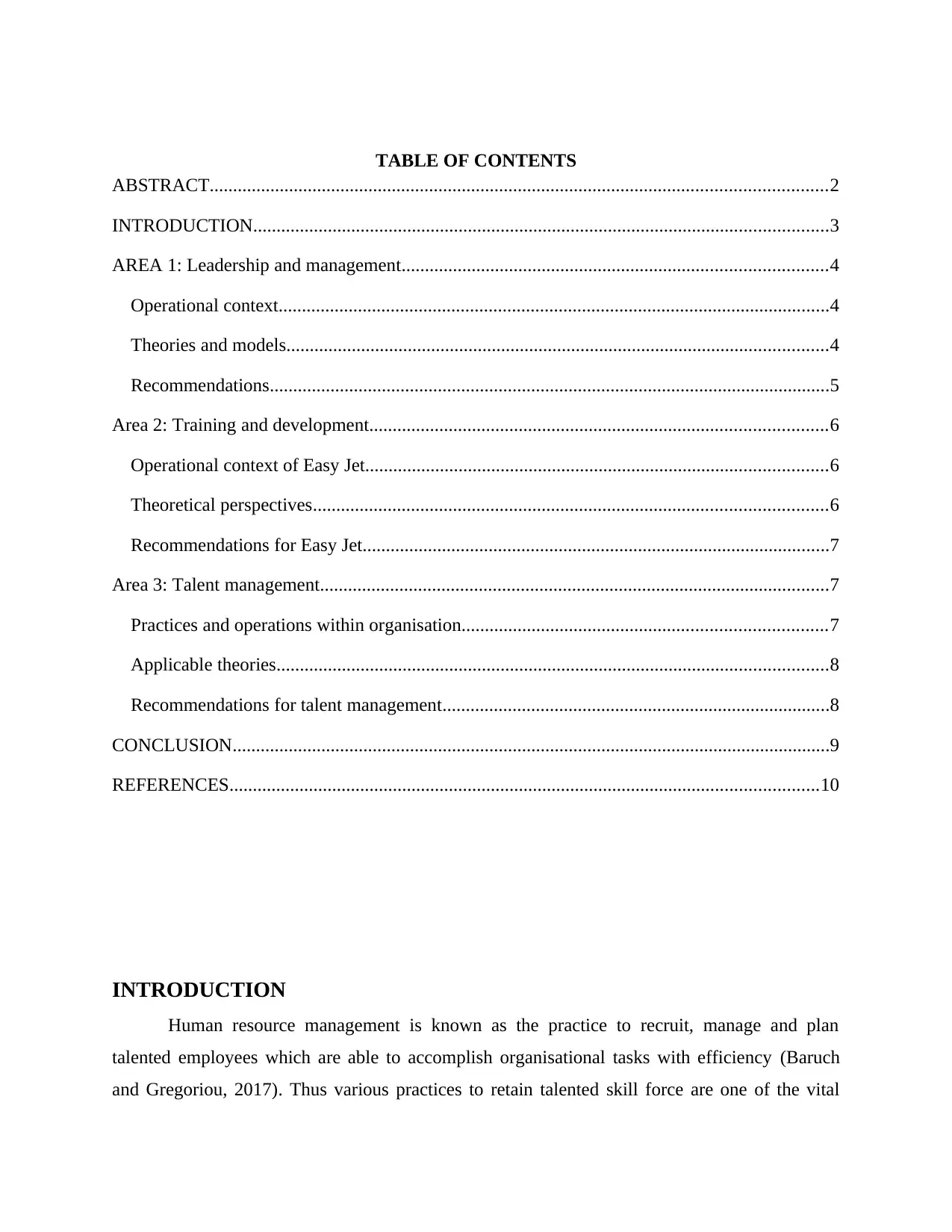
TABLE OF CONTENTS
ABSTRACT....................................................................................................................................2
INTRODUCTION...........................................................................................................................3
AREA 1: Leadership and management...........................................................................................4
Operational context......................................................................................................................4
Theories and models....................................................................................................................4
Recommendations........................................................................................................................5
Area 2: Training and development..................................................................................................6
Operational context of Easy Jet...................................................................................................6
Theoretical perspectives..............................................................................................................6
Recommendations for Easy Jet....................................................................................................7
Area 3: Talent management.............................................................................................................7
Practices and operations within organisation..............................................................................7
Applicable theories......................................................................................................................8
Recommendations for talent management...................................................................................8
CONCLUSION................................................................................................................................9
REFERENCES..............................................................................................................................10
INTRODUCTION
Human resource management is known as the practice to recruit, manage and plan
talented employees which are able to accomplish organisational tasks with efficiency (Baruch
and Gregoriou, 2017). Thus various practices to retain talented skill force are one of the vital
ABSTRACT....................................................................................................................................2
INTRODUCTION...........................................................................................................................3
AREA 1: Leadership and management...........................................................................................4
Operational context......................................................................................................................4
Theories and models....................................................................................................................4
Recommendations........................................................................................................................5
Area 2: Training and development..................................................................................................6
Operational context of Easy Jet...................................................................................................6
Theoretical perspectives..............................................................................................................6
Recommendations for Easy Jet....................................................................................................7
Area 3: Talent management.............................................................................................................7
Practices and operations within organisation..............................................................................7
Applicable theories......................................................................................................................8
Recommendations for talent management...................................................................................8
CONCLUSION................................................................................................................................9
REFERENCES..............................................................................................................................10
INTRODUCTION
Human resource management is known as the practice to recruit, manage and plan
talented employees which are able to accomplish organisational tasks with efficiency (Baruch
and Gregoriou, 2017). Thus various practices to retain talented skill force are one of the vital
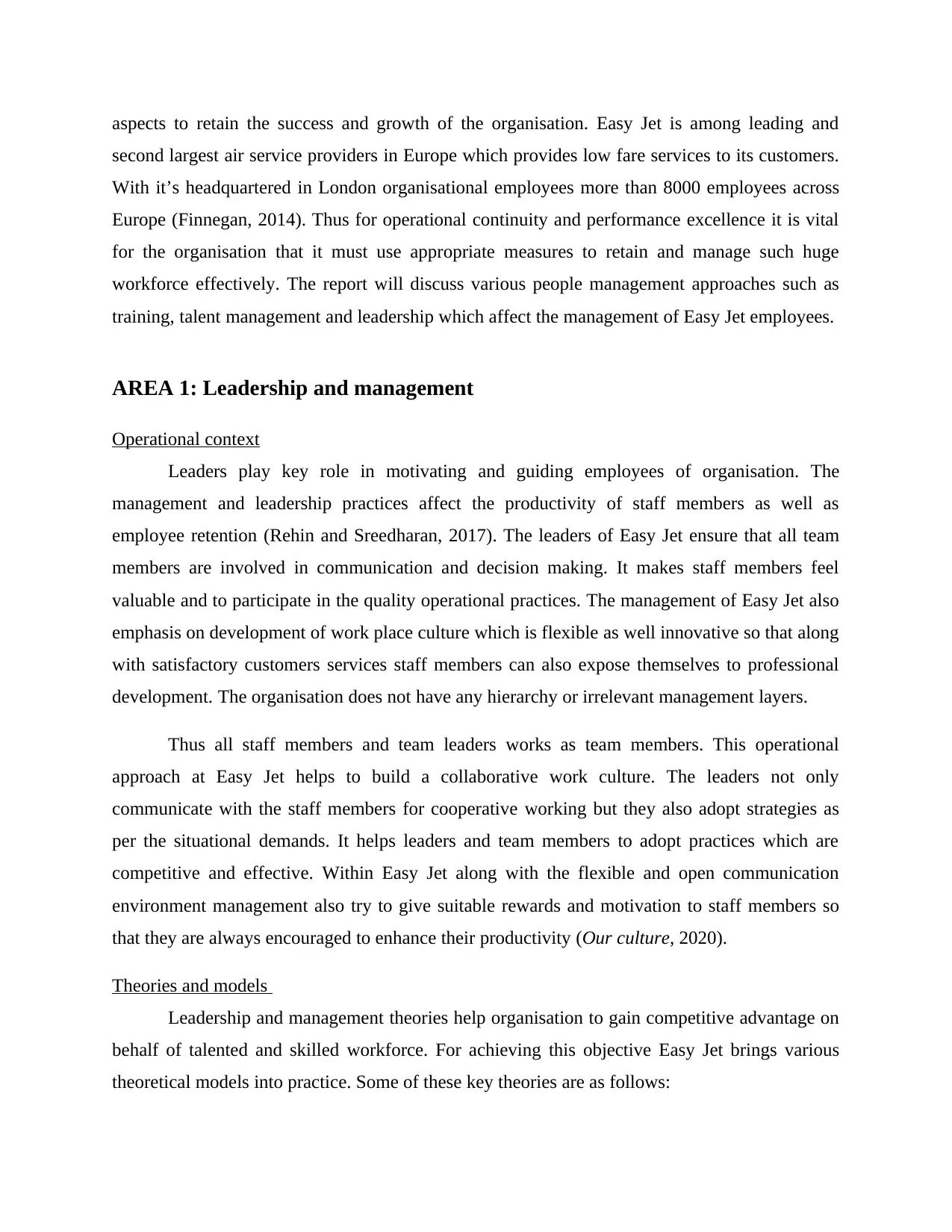
aspects to retain the success and growth of the organisation. Easy Jet is among leading and
second largest air service providers in Europe which provides low fare services to its customers.
With it’s headquartered in London organisational employees more than 8000 employees across
Europe (Finnegan, 2014). Thus for operational continuity and performance excellence it is vital
for the organisation that it must use appropriate measures to retain and manage such huge
workforce effectively. The report will discuss various people management approaches such as
training, talent management and leadership which affect the management of Easy Jet employees.
AREA 1: Leadership and management
Operational context
Leaders play key role in motivating and guiding employees of organisation. The
management and leadership practices affect the productivity of staff members as well as
employee retention (Rehin and Sreedharan, 2017). The leaders of Easy Jet ensure that all team
members are involved in communication and decision making. It makes staff members feel
valuable and to participate in the quality operational practices. The management of Easy Jet also
emphasis on development of work place culture which is flexible as well innovative so that along
with satisfactory customers services staff members can also expose themselves to professional
development. The organisation does not have any hierarchy or irrelevant management layers.
Thus all staff members and team leaders works as team members. This operational
approach at Easy Jet helps to build a collaborative work culture. The leaders not only
communicate with the staff members for cooperative working but they also adopt strategies as
per the situational demands. It helps leaders and team members to adopt practices which are
competitive and effective. Within Easy Jet along with the flexible and open communication
environment management also try to give suitable rewards and motivation to staff members so
that they are always encouraged to enhance their productivity (Our culture, 2020).
Theories and models
Leadership and management theories help organisation to gain competitive advantage on
behalf of talented and skilled workforce. For achieving this objective Easy Jet brings various
theoretical models into practice. Some of these key theories are as follows:
second largest air service providers in Europe which provides low fare services to its customers.
With it’s headquartered in London organisational employees more than 8000 employees across
Europe (Finnegan, 2014). Thus for operational continuity and performance excellence it is vital
for the organisation that it must use appropriate measures to retain and manage such huge
workforce effectively. The report will discuss various people management approaches such as
training, talent management and leadership which affect the management of Easy Jet employees.
AREA 1: Leadership and management
Operational context
Leaders play key role in motivating and guiding employees of organisation. The
management and leadership practices affect the productivity of staff members as well as
employee retention (Rehin and Sreedharan, 2017). The leaders of Easy Jet ensure that all team
members are involved in communication and decision making. It makes staff members feel
valuable and to participate in the quality operational practices. The management of Easy Jet also
emphasis on development of work place culture which is flexible as well innovative so that along
with satisfactory customers services staff members can also expose themselves to professional
development. The organisation does not have any hierarchy or irrelevant management layers.
Thus all staff members and team leaders works as team members. This operational
approach at Easy Jet helps to build a collaborative work culture. The leaders not only
communicate with the staff members for cooperative working but they also adopt strategies as
per the situational demands. It helps leaders and team members to adopt practices which are
competitive and effective. Within Easy Jet along with the flexible and open communication
environment management also try to give suitable rewards and motivation to staff members so
that they are always encouraged to enhance their productivity (Our culture, 2020).
Theories and models
Leadership and management theories help organisation to gain competitive advantage on
behalf of talented and skilled workforce. For achieving this objective Easy Jet brings various
theoretical models into practice. Some of these key theories are as follows:
Secure Best Marks with AI Grader
Need help grading? Try our AI Grader for instant feedback on your assignments.
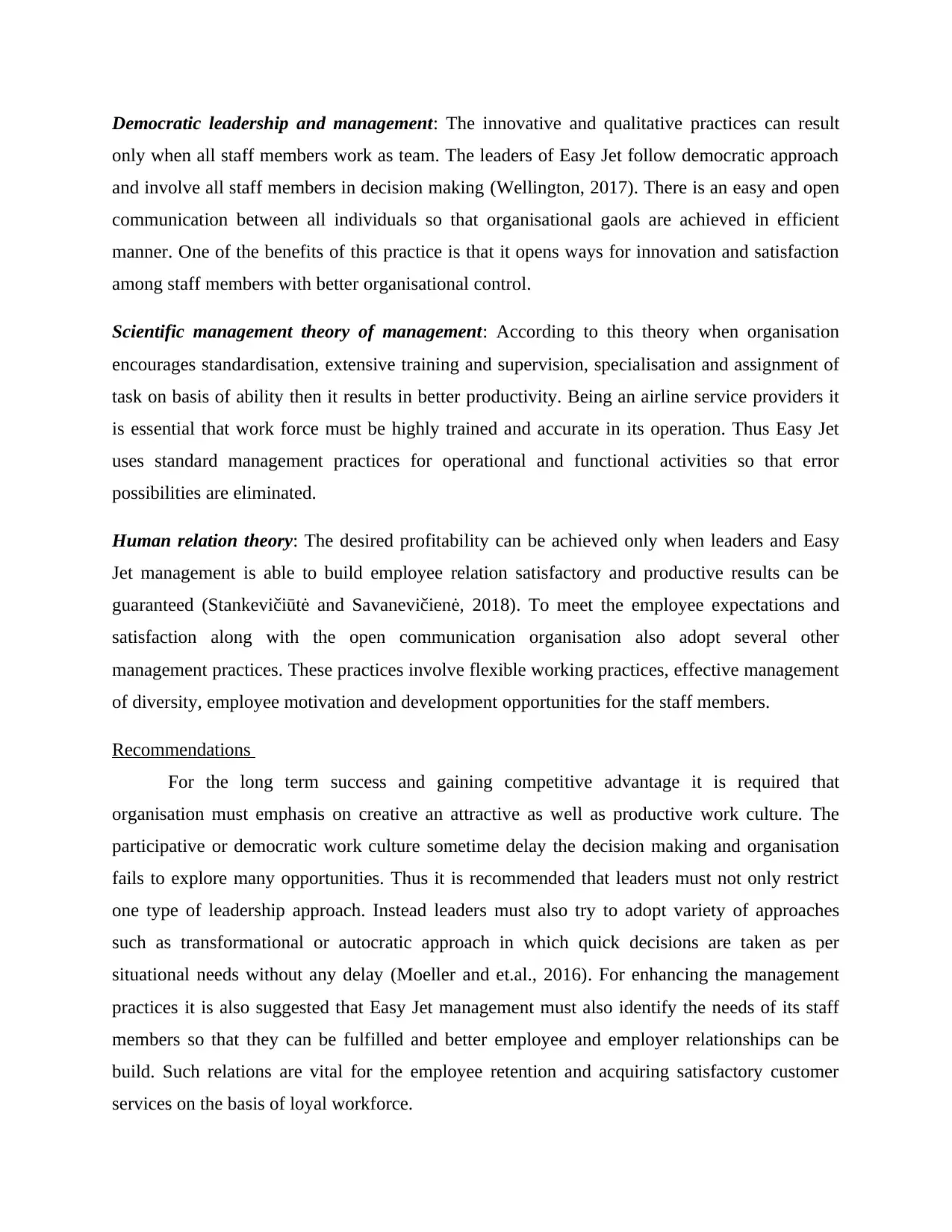
Democratic leadership and management: The innovative and qualitative practices can result
only when all staff members work as team. The leaders of Easy Jet follow democratic approach
and involve all staff members in decision making (Wellington, 2017). There is an easy and open
communication between all individuals so that organisational gaols are achieved in efficient
manner. One of the benefits of this practice is that it opens ways for innovation and satisfaction
among staff members with better organisational control.
Scientific management theory of management: According to this theory when organisation
encourages standardisation, extensive training and supervision, specialisation and assignment of
task on basis of ability then it results in better productivity. Being an airline service providers it
is essential that work force must be highly trained and accurate in its operation. Thus Easy Jet
uses standard management practices for operational and functional activities so that error
possibilities are eliminated.
Human relation theory: The desired profitability can be achieved only when leaders and Easy
Jet management is able to build employee relation satisfactory and productive results can be
guaranteed (Stankevičiūtė and Savanevičienė, 2018). To meet the employee expectations and
satisfaction along with the open communication organisation also adopt several other
management practices. These practices involve flexible working practices, effective management
of diversity, employee motivation and development opportunities for the staff members.
Recommendations
For the long term success and gaining competitive advantage it is required that
organisation must emphasis on creative an attractive as well as productive work culture. The
participative or democratic work culture sometime delay the decision making and organisation
fails to explore many opportunities. Thus it is recommended that leaders must not only restrict
one type of leadership approach. Instead leaders must also try to adopt variety of approaches
such as transformational or autocratic approach in which quick decisions are taken as per
situational needs without any delay (Moeller and et.al., 2016). For enhancing the management
practices it is also suggested that Easy Jet management must also identify the needs of its staff
members so that they can be fulfilled and better employee and employer relationships can be
build. Such relations are vital for the employee retention and acquiring satisfactory customer
services on the basis of loyal workforce.
only when all staff members work as team. The leaders of Easy Jet follow democratic approach
and involve all staff members in decision making (Wellington, 2017). There is an easy and open
communication between all individuals so that organisational gaols are achieved in efficient
manner. One of the benefits of this practice is that it opens ways for innovation and satisfaction
among staff members with better organisational control.
Scientific management theory of management: According to this theory when organisation
encourages standardisation, extensive training and supervision, specialisation and assignment of
task on basis of ability then it results in better productivity. Being an airline service providers it
is essential that work force must be highly trained and accurate in its operation. Thus Easy Jet
uses standard management practices for operational and functional activities so that error
possibilities are eliminated.
Human relation theory: The desired profitability can be achieved only when leaders and Easy
Jet management is able to build employee relation satisfactory and productive results can be
guaranteed (Stankevičiūtė and Savanevičienė, 2018). To meet the employee expectations and
satisfaction along with the open communication organisation also adopt several other
management practices. These practices involve flexible working practices, effective management
of diversity, employee motivation and development opportunities for the staff members.
Recommendations
For the long term success and gaining competitive advantage it is required that
organisation must emphasis on creative an attractive as well as productive work culture. The
participative or democratic work culture sometime delay the decision making and organisation
fails to explore many opportunities. Thus it is recommended that leaders must not only restrict
one type of leadership approach. Instead leaders must also try to adopt variety of approaches
such as transformational or autocratic approach in which quick decisions are taken as per
situational needs without any delay (Moeller and et.al., 2016). For enhancing the management
practices it is also suggested that Easy Jet management must also identify the needs of its staff
members so that they can be fulfilled and better employee and employer relationships can be
build. Such relations are vital for the employee retention and acquiring satisfactory customer
services on the basis of loyal workforce.
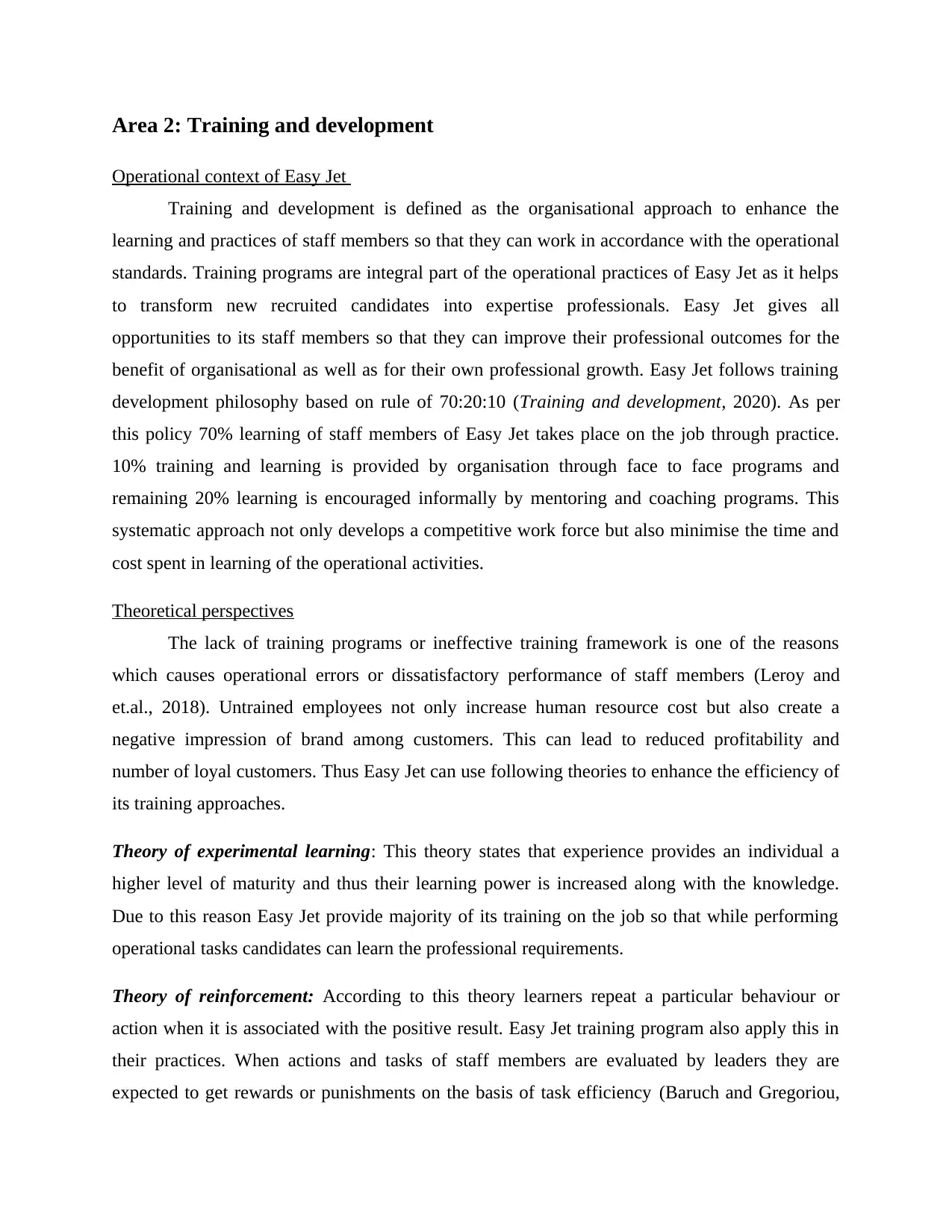
Area 2: Training and development
Operational context of Easy Jet
Training and development is defined as the organisational approach to enhance the
learning and practices of staff members so that they can work in accordance with the operational
standards. Training programs are integral part of the operational practices of Easy Jet as it helps
to transform new recruited candidates into expertise professionals. Easy Jet gives all
opportunities to its staff members so that they can improve their professional outcomes for the
benefit of organisational as well as for their own professional growth. Easy Jet follows training
development philosophy based on rule of 70:20:10 (Training and development, 2020). As per
this policy 70% learning of staff members of Easy Jet takes place on the job through practice.
10% training and learning is provided by organisation through face to face programs and
remaining 20% learning is encouraged informally by mentoring and coaching programs. This
systematic approach not only develops a competitive work force but also minimise the time and
cost spent in learning of the operational activities.
Theoretical perspectives
The lack of training programs or ineffective training framework is one of the reasons
which causes operational errors or dissatisfactory performance of staff members (Leroy and
et.al., 2018). Untrained employees not only increase human resource cost but also create a
negative impression of brand among customers. This can lead to reduced profitability and
number of loyal customers. Thus Easy Jet can use following theories to enhance the efficiency of
its training approaches.
Theory of experimental learning: This theory states that experience provides an individual a
higher level of maturity and thus their learning power is increased along with the knowledge.
Due to this reason Easy Jet provide majority of its training on the job so that while performing
operational tasks candidates can learn the professional requirements.
Theory of reinforcement: According to this theory learners repeat a particular behaviour or
action when it is associated with the positive result. Easy Jet training program also apply this in
their practices. When actions and tasks of staff members are evaluated by leaders they are
expected to get rewards or punishments on the basis of task efficiency (Baruch and Gregoriou,
Operational context of Easy Jet
Training and development is defined as the organisational approach to enhance the
learning and practices of staff members so that they can work in accordance with the operational
standards. Training programs are integral part of the operational practices of Easy Jet as it helps
to transform new recruited candidates into expertise professionals. Easy Jet gives all
opportunities to its staff members so that they can improve their professional outcomes for the
benefit of organisational as well as for their own professional growth. Easy Jet follows training
development philosophy based on rule of 70:20:10 (Training and development, 2020). As per
this policy 70% learning of staff members of Easy Jet takes place on the job through practice.
10% training and learning is provided by organisation through face to face programs and
remaining 20% learning is encouraged informally by mentoring and coaching programs. This
systematic approach not only develops a competitive work force but also minimise the time and
cost spent in learning of the operational activities.
Theoretical perspectives
The lack of training programs or ineffective training framework is one of the reasons
which causes operational errors or dissatisfactory performance of staff members (Leroy and
et.al., 2018). Untrained employees not only increase human resource cost but also create a
negative impression of brand among customers. This can lead to reduced profitability and
number of loyal customers. Thus Easy Jet can use following theories to enhance the efficiency of
its training approaches.
Theory of experimental learning: This theory states that experience provides an individual a
higher level of maturity and thus their learning power is increased along with the knowledge.
Due to this reason Easy Jet provide majority of its training on the job so that while performing
operational tasks candidates can learn the professional requirements.
Theory of reinforcement: According to this theory learners repeat a particular behaviour or
action when it is associated with the positive result. Easy Jet training program also apply this in
their practices. When actions and tasks of staff members are evaluated by leaders they are
expected to get rewards or punishments on the basis of task efficiency (Baruch and Gregoriou,
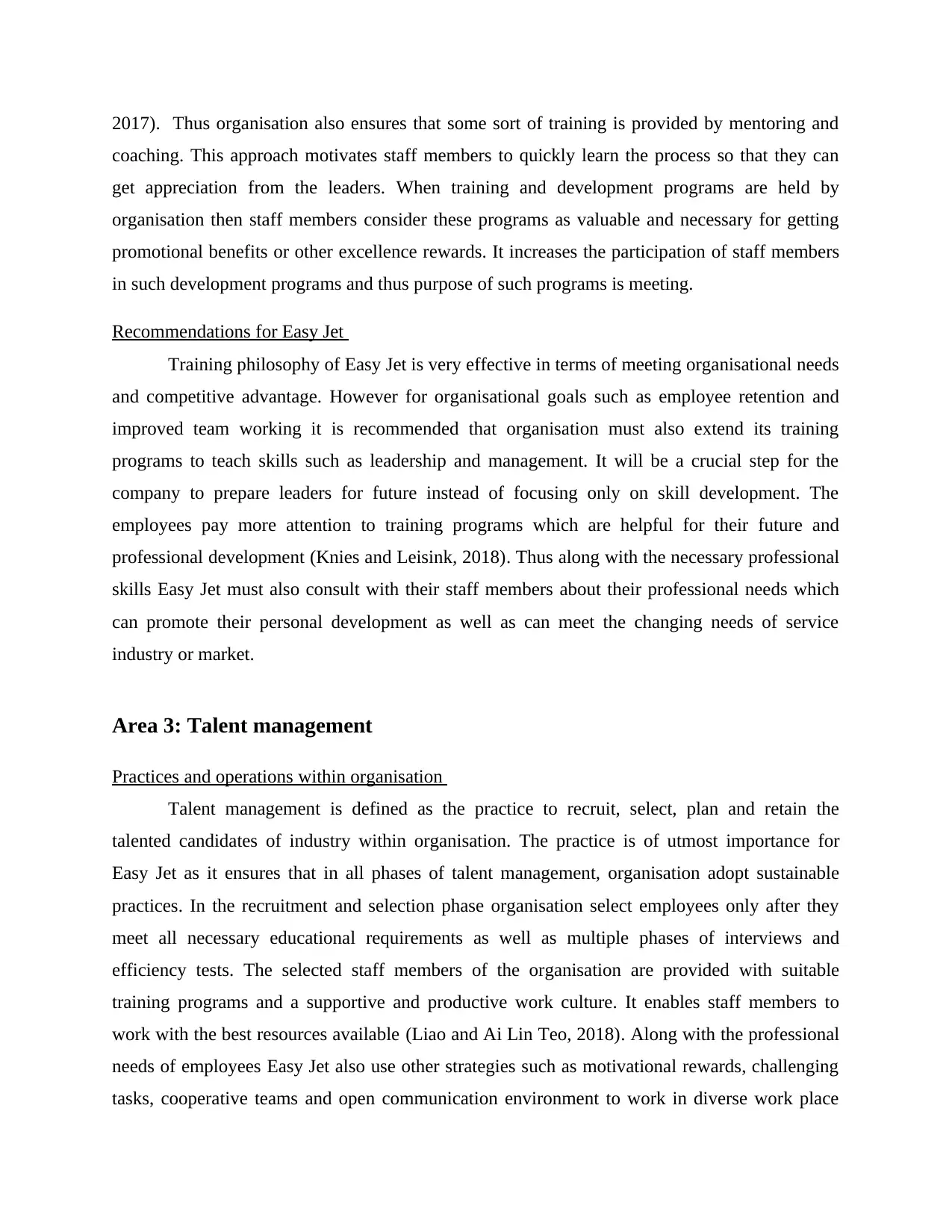
2017). Thus organisation also ensures that some sort of training is provided by mentoring and
coaching. This approach motivates staff members to quickly learn the process so that they can
get appreciation from the leaders. When training and development programs are held by
organisation then staff members consider these programs as valuable and necessary for getting
promotional benefits or other excellence rewards. It increases the participation of staff members
in such development programs and thus purpose of such programs is meeting.
Recommendations for Easy Jet
Training philosophy of Easy Jet is very effective in terms of meeting organisational needs
and competitive advantage. However for organisational goals such as employee retention and
improved team working it is recommended that organisation must also extend its training
programs to teach skills such as leadership and management. It will be a crucial step for the
company to prepare leaders for future instead of focusing only on skill development. The
employees pay more attention to training programs which are helpful for their future and
professional development (Knies and Leisink, 2018). Thus along with the necessary professional
skills Easy Jet must also consult with their staff members about their professional needs which
can promote their personal development as well as can meet the changing needs of service
industry or market.
Area 3: Talent management
Practices and operations within organisation
Talent management is defined as the practice to recruit, select, plan and retain the
talented candidates of industry within organisation. The practice is of utmost importance for
Easy Jet as it ensures that in all phases of talent management, organisation adopt sustainable
practices. In the recruitment and selection phase organisation select employees only after they
meet all necessary educational requirements as well as multiple phases of interviews and
efficiency tests. The selected staff members of the organisation are provided with suitable
training programs and a supportive and productive work culture. It enables staff members to
work with the best resources available (Liao and Ai Lin Teo, 2018). Along with the professional
needs of employees Easy Jet also use other strategies such as motivational rewards, challenging
tasks, cooperative teams and open communication environment to work in diverse work place
coaching. This approach motivates staff members to quickly learn the process so that they can
get appreciation from the leaders. When training and development programs are held by
organisation then staff members consider these programs as valuable and necessary for getting
promotional benefits or other excellence rewards. It increases the participation of staff members
in such development programs and thus purpose of such programs is meeting.
Recommendations for Easy Jet
Training philosophy of Easy Jet is very effective in terms of meeting organisational needs
and competitive advantage. However for organisational goals such as employee retention and
improved team working it is recommended that organisation must also extend its training
programs to teach skills such as leadership and management. It will be a crucial step for the
company to prepare leaders for future instead of focusing only on skill development. The
employees pay more attention to training programs which are helpful for their future and
professional development (Knies and Leisink, 2018). Thus along with the necessary professional
skills Easy Jet must also consult with their staff members about their professional needs which
can promote their personal development as well as can meet the changing needs of service
industry or market.
Area 3: Talent management
Practices and operations within organisation
Talent management is defined as the practice to recruit, select, plan and retain the
talented candidates of industry within organisation. The practice is of utmost importance for
Easy Jet as it ensures that in all phases of talent management, organisation adopt sustainable
practices. In the recruitment and selection phase organisation select employees only after they
meet all necessary educational requirements as well as multiple phases of interviews and
efficiency tests. The selected staff members of the organisation are provided with suitable
training programs and a supportive and productive work culture. It enables staff members to
work with the best resources available (Liao and Ai Lin Teo, 2018). Along with the professional
needs of employees Easy Jet also use other strategies such as motivational rewards, challenging
tasks, cooperative teams and open communication environment to work in diverse work place
Paraphrase This Document
Need a fresh take? Get an instant paraphrase of this document with our AI Paraphraser
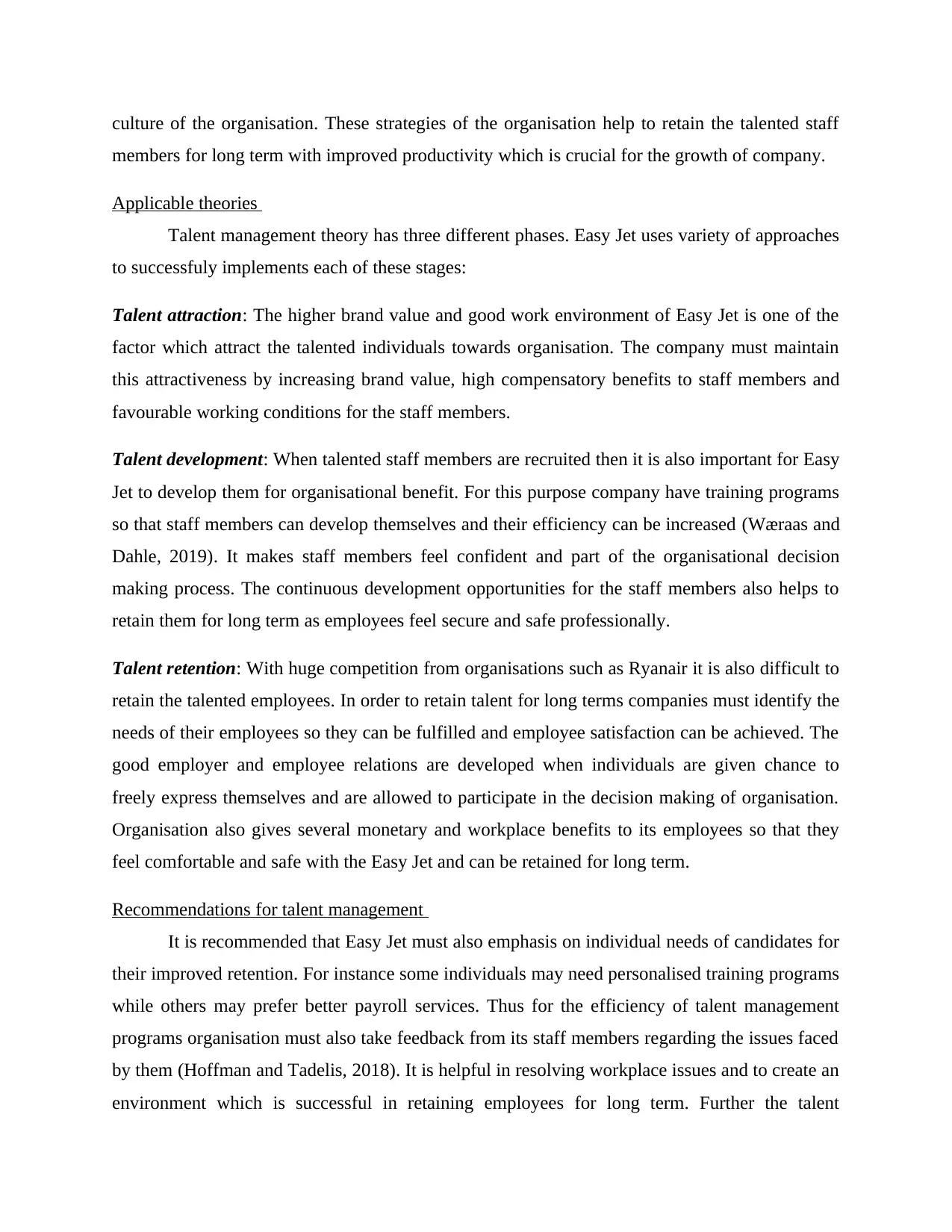
culture of the organisation. These strategies of the organisation help to retain the talented staff
members for long term with improved productivity which is crucial for the growth of company.
Applicable theories
Talent management theory has three different phases. Easy Jet uses variety of approaches
to successfuly implements each of these stages:
Talent attraction: The higher brand value and good work environment of Easy Jet is one of the
factor which attract the talented individuals towards organisation. The company must maintain
this attractiveness by increasing brand value, high compensatory benefits to staff members and
favourable working conditions for the staff members.
Talent development: When talented staff members are recruited then it is also important for Easy
Jet to develop them for organisational benefit. For this purpose company have training programs
so that staff members can develop themselves and their efficiency can be increased (Wæraas and
Dahle, 2019). It makes staff members feel confident and part of the organisational decision
making process. The continuous development opportunities for the staff members also helps to
retain them for long term as employees feel secure and safe professionally.
Talent retention: With huge competition from organisations such as Ryanair it is also difficult to
retain the talented employees. In order to retain talent for long terms companies must identify the
needs of their employees so they can be fulfilled and employee satisfaction can be achieved. The
good employer and employee relations are developed when individuals are given chance to
freely express themselves and are allowed to participate in the decision making of organisation.
Organisation also gives several monetary and workplace benefits to its employees so that they
feel comfortable and safe with the Easy Jet and can be retained for long term.
Recommendations for talent management
It is recommended that Easy Jet must also emphasis on individual needs of candidates for
their improved retention. For instance some individuals may need personalised training programs
while others may prefer better payroll services. Thus for the efficiency of talent management
programs organisation must also take feedback from its staff members regarding the issues faced
by them (Hoffman and Tadelis, 2018). It is helpful in resolving workplace issues and to create an
environment which is successful in retaining employees for long term. Further the talent
members for long term with improved productivity which is crucial for the growth of company.
Applicable theories
Talent management theory has three different phases. Easy Jet uses variety of approaches
to successfuly implements each of these stages:
Talent attraction: The higher brand value and good work environment of Easy Jet is one of the
factor which attract the talented individuals towards organisation. The company must maintain
this attractiveness by increasing brand value, high compensatory benefits to staff members and
favourable working conditions for the staff members.
Talent development: When talented staff members are recruited then it is also important for Easy
Jet to develop them for organisational benefit. For this purpose company have training programs
so that staff members can develop themselves and their efficiency can be increased (Wæraas and
Dahle, 2019). It makes staff members feel confident and part of the organisational decision
making process. The continuous development opportunities for the staff members also helps to
retain them for long term as employees feel secure and safe professionally.
Talent retention: With huge competition from organisations such as Ryanair it is also difficult to
retain the talented employees. In order to retain talent for long terms companies must identify the
needs of their employees so they can be fulfilled and employee satisfaction can be achieved. The
good employer and employee relations are developed when individuals are given chance to
freely express themselves and are allowed to participate in the decision making of organisation.
Organisation also gives several monetary and workplace benefits to its employees so that they
feel comfortable and safe with the Easy Jet and can be retained for long term.
Recommendations for talent management
It is recommended that Easy Jet must also emphasis on individual needs of candidates for
their improved retention. For instance some individuals may need personalised training programs
while others may prefer better payroll services. Thus for the efficiency of talent management
programs organisation must also take feedback from its staff members regarding the issues faced
by them (Hoffman and Tadelis, 2018). It is helpful in resolving workplace issues and to create an
environment which is successful in retaining employees for long term. Further the talent
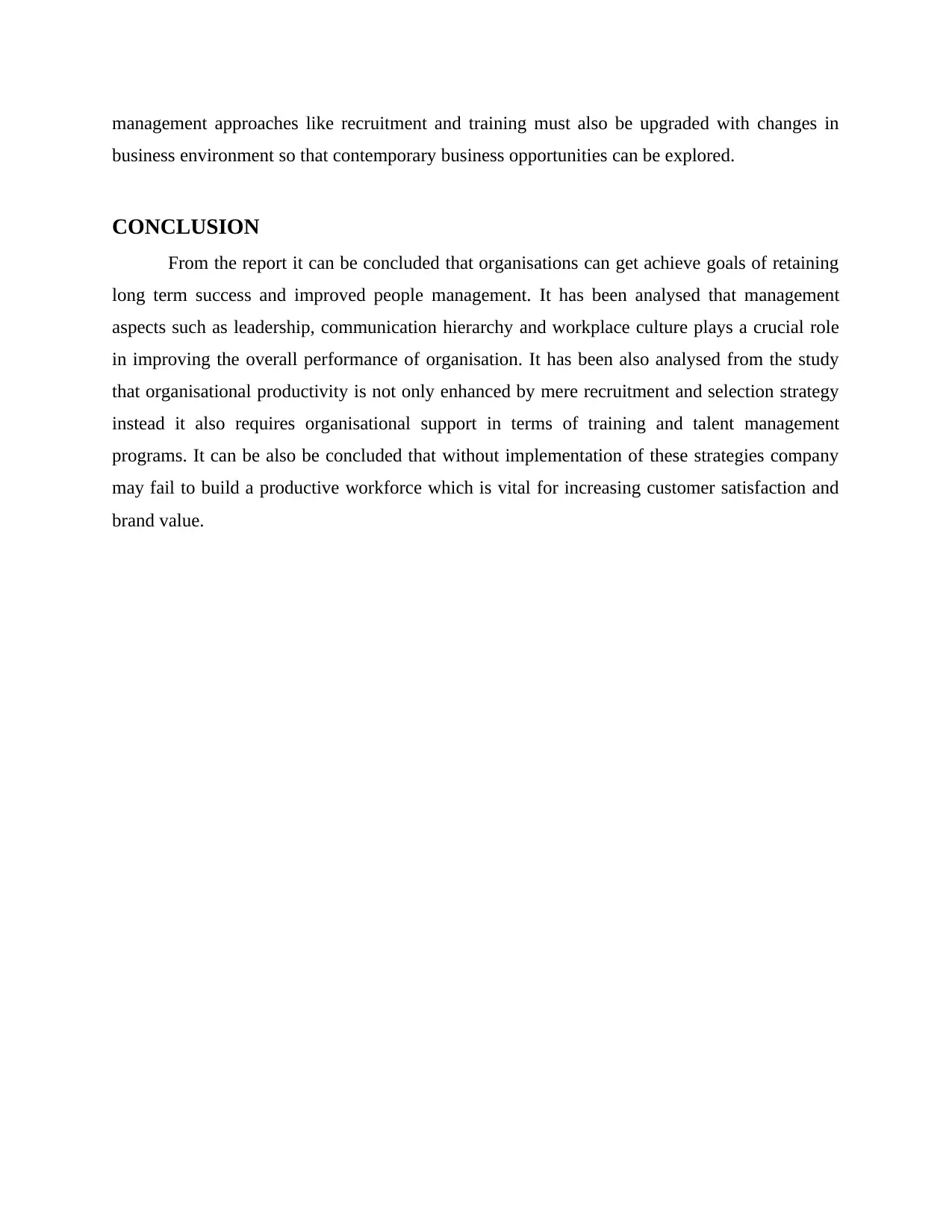
management approaches like recruitment and training must also be upgraded with changes in
business environment so that contemporary business opportunities can be explored.
CONCLUSION
From the report it can be concluded that organisations can get achieve goals of retaining
long term success and improved people management. It has been analysed that management
aspects such as leadership, communication hierarchy and workplace culture plays a crucial role
in improving the overall performance of organisation. It has been also analysed from the study
that organisational productivity is not only enhanced by mere recruitment and selection strategy
instead it also requires organisational support in terms of training and talent management
programs. It can be also be concluded that without implementation of these strategies company
may fail to build a productive workforce which is vital for increasing customer satisfaction and
brand value.
business environment so that contemporary business opportunities can be explored.
CONCLUSION
From the report it can be concluded that organisations can get achieve goals of retaining
long term success and improved people management. It has been analysed that management
aspects such as leadership, communication hierarchy and workplace culture plays a crucial role
in improving the overall performance of organisation. It has been also analysed from the study
that organisational productivity is not only enhanced by mere recruitment and selection strategy
instead it also requires organisational support in terms of training and talent management
programs. It can be also be concluded that without implementation of these strategies company
may fail to build a productive workforce which is vital for increasing customer satisfaction and
brand value.
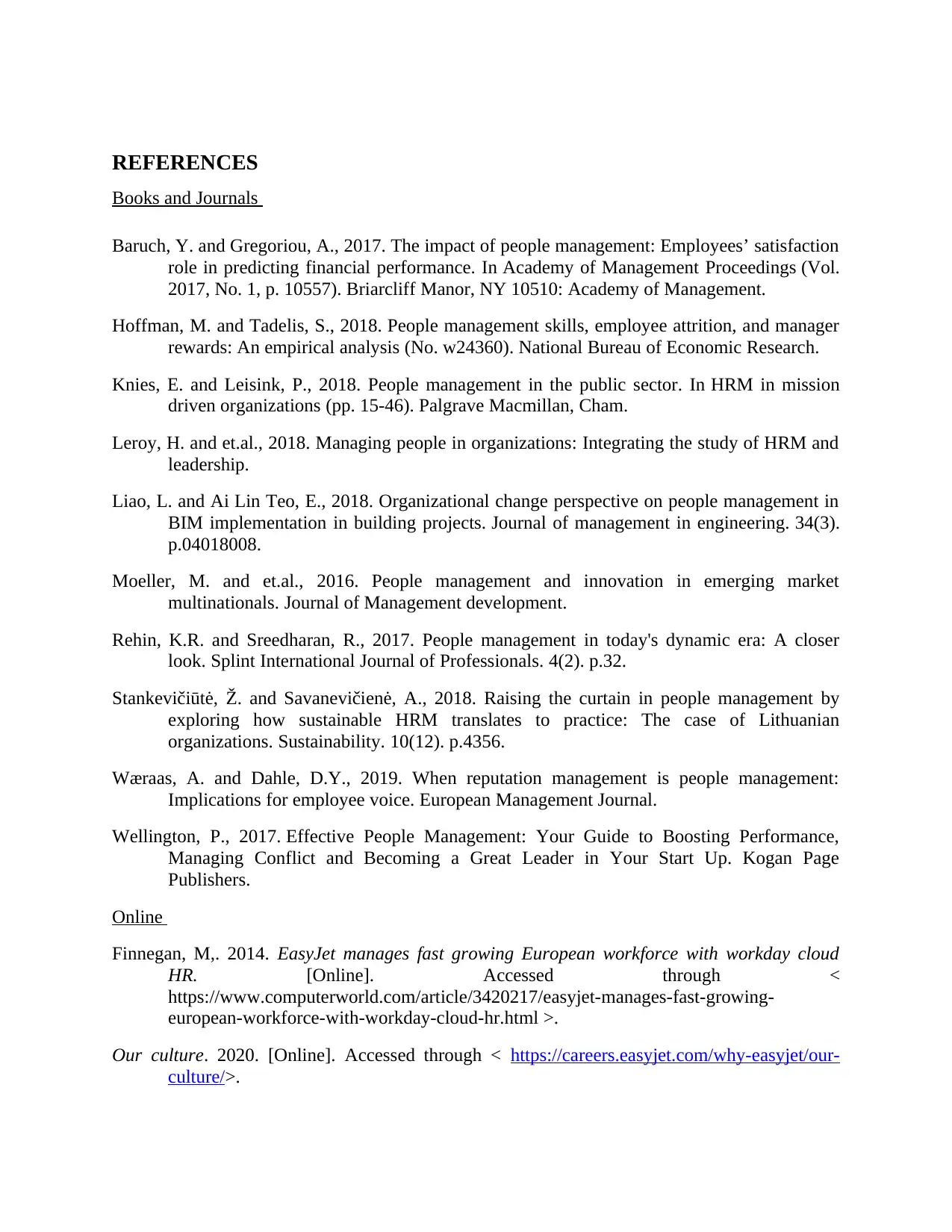
REFERENCES
Books and Journals
Baruch, Y. and Gregoriou, A., 2017. The impact of people management: Employees’ satisfaction
role in predicting financial performance. In Academy of Management Proceedings (Vol.
2017, No. 1, p. 10557). Briarcliff Manor, NY 10510: Academy of Management.
Hoffman, M. and Tadelis, S., 2018. People management skills, employee attrition, and manager
rewards: An empirical analysis (No. w24360). National Bureau of Economic Research.
Knies, E. and Leisink, P., 2018. People management in the public sector. In HRM in mission
driven organizations (pp. 15-46). Palgrave Macmillan, Cham.
Leroy, H. and et.al., 2018. Managing people in organizations: Integrating the study of HRM and
leadership.
Liao, L. and Ai Lin Teo, E., 2018. Organizational change perspective on people management in
BIM implementation in building projects. Journal of management in engineering. 34(3).
p.04018008.
Moeller, M. and et.al., 2016. People management and innovation in emerging market
multinationals. Journal of Management development.
Rehin, K.R. and Sreedharan, R., 2017. People management in today's dynamic era: A closer
look. Splint International Journal of Professionals. 4(2). p.32.
Stankevičiūtė, Ž. and Savanevičienė, A., 2018. Raising the curtain in people management by
exploring how sustainable HRM translates to practice: The case of Lithuanian
organizations. Sustainability. 10(12). p.4356.
Wæraas, A. and Dahle, D.Y., 2019. When reputation management is people management:
Implications for employee voice. European Management Journal.
Wellington, P., 2017. Effective People Management: Your Guide to Boosting Performance,
Managing Conflict and Becoming a Great Leader in Your Start Up. Kogan Page
Publishers.
Online
Finnegan, M,. 2014. EasyJet manages fast growing European workforce with workday cloud
HR. [Online]. Accessed through <
https://www.computerworld.com/article/3420217/easyjet-manages-fast-growing-
european-workforce-with-workday-cloud-hr.html >.
Our culture. 2020. [Online]. Accessed through < https://careers.easyjet.com/why-easyjet/our-
culture/>.
Books and Journals
Baruch, Y. and Gregoriou, A., 2017. The impact of people management: Employees’ satisfaction
role in predicting financial performance. In Academy of Management Proceedings (Vol.
2017, No. 1, p. 10557). Briarcliff Manor, NY 10510: Academy of Management.
Hoffman, M. and Tadelis, S., 2018. People management skills, employee attrition, and manager
rewards: An empirical analysis (No. w24360). National Bureau of Economic Research.
Knies, E. and Leisink, P., 2018. People management in the public sector. In HRM in mission
driven organizations (pp. 15-46). Palgrave Macmillan, Cham.
Leroy, H. and et.al., 2018. Managing people in organizations: Integrating the study of HRM and
leadership.
Liao, L. and Ai Lin Teo, E., 2018. Organizational change perspective on people management in
BIM implementation in building projects. Journal of management in engineering. 34(3).
p.04018008.
Moeller, M. and et.al., 2016. People management and innovation in emerging market
multinationals. Journal of Management development.
Rehin, K.R. and Sreedharan, R., 2017. People management in today's dynamic era: A closer
look. Splint International Journal of Professionals. 4(2). p.32.
Stankevičiūtė, Ž. and Savanevičienė, A., 2018. Raising the curtain in people management by
exploring how sustainable HRM translates to practice: The case of Lithuanian
organizations. Sustainability. 10(12). p.4356.
Wæraas, A. and Dahle, D.Y., 2019. When reputation management is people management:
Implications for employee voice. European Management Journal.
Wellington, P., 2017. Effective People Management: Your Guide to Boosting Performance,
Managing Conflict and Becoming a Great Leader in Your Start Up. Kogan Page
Publishers.
Online
Finnegan, M,. 2014. EasyJet manages fast growing European workforce with workday cloud
HR. [Online]. Accessed through <
https://www.computerworld.com/article/3420217/easyjet-manages-fast-growing-
european-workforce-with-workday-cloud-hr.html >.
Our culture. 2020. [Online]. Accessed through < https://careers.easyjet.com/why-easyjet/our-
culture/>.
Secure Best Marks with AI Grader
Need help grading? Try our AI Grader for instant feedback on your assignments.

Training and development. 2020. [Online]. Accessed through https://careers.easyjet.com/why-
easyjet/training-development/ .
easyjet/training-development/ .
1 out of 11
Related Documents
Your All-in-One AI-Powered Toolkit for Academic Success.
+13062052269
info@desklib.com
Available 24*7 on WhatsApp / Email
![[object Object]](/_next/static/media/star-bottom.7253800d.svg)
Unlock your academic potential
© 2024 | Zucol Services PVT LTD | All rights reserved.





